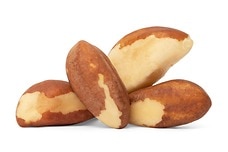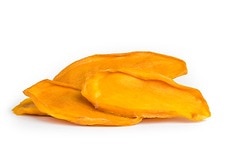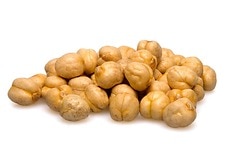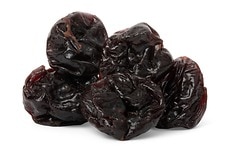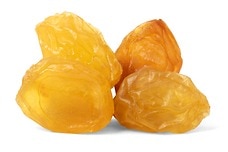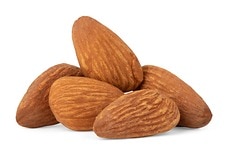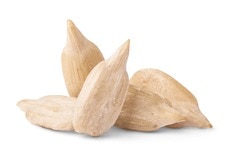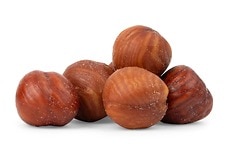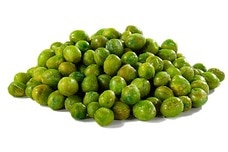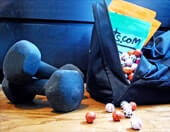Healthy Snacks for Runners: Nutrition, Recipes & More
At the end of your run, when you look to the clock— are you satisfied? Whether you're just starting or you've been running for decades, the highs of a PR and the lows of an enduring plateau are surely both familiar. So, how do you break through the wall and get to that next level? The answer's almost always simpler than you'd think: nutrition.
Any sprinter or marathoner can tell you that one of the essential factors in any training plan is eating right. So, what does eating right entail? That all depends on your goals.
Nutritional Considerations for Runners
Our bodies require three major nutrients to stay active: carbohydrates, proteins, and fats. Carbohydrates are often the focus of a runner's diet— and for good reason.
Carbohydrates are one of the main sources of fuel for the aerobic systems that produce the majority of energy for various running workouts. While fats and protein also play and integral role to this system, their contributions are limited by the availability of carbohydrates.
There are two main classes of carbohydrates. Simple carbohydrates are basic sugars; your body quickly burns these molecules as fuel. Complex carbohydrates, on the other hand, are composites of these sugars that result in a more intricate structure at the molecular level. To break down these more elaborate compounds, also known as starches, your body must work harder and longer (Meyer, Boucherm & Leutholtz, n.d.).
Once digested, carbohydrates yield glucose molecules that increase the available energy in your body. These molecules, in turn, are used by cells throughout the body to contract your muscles, breathe more heavily, and circulate blood. Thus, getting enough carbohydrates is critical not only to any effective exercise session- but also to the metabolic processes on which you rely as a part of your daily life (Bede, 2015).
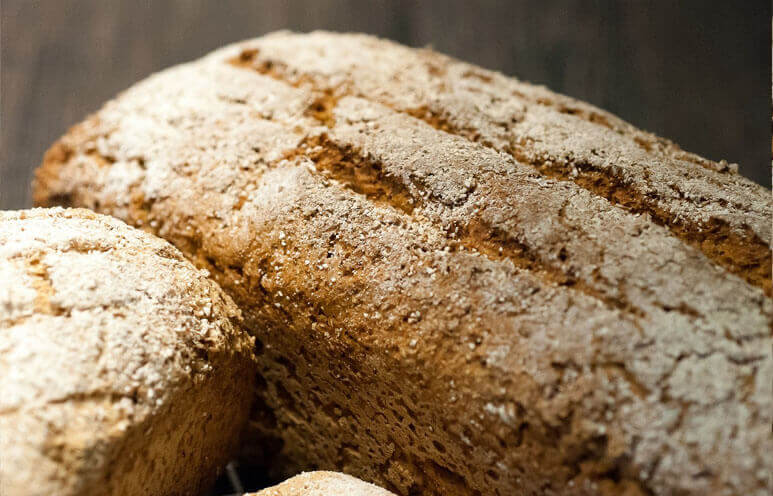
Enduring workouts, and particularly those marked by low intensity, will also rely on fats as a source of energy. A gram of fat does have more calories than protein or carbohydrates, but the body relies on the energy from carbohydrates to metabolize fats and take advantage of this energy. In spite of this reliance, fats play an integral role in powering your run.
Polyunsaturated and monounsaturated fats can actually rev up your metabolism and keep it humming along after your workout is complete, making it a great fuel source for those running to lose weight. It can also help to alternate the intensity of workouts to facilitate fat-burning processes with low intensity runs and burn more calories with high intensity sessions.
Lastly, lean protein keeps you feeling full throughout the day, which can prevent post-workout cravings. When it comes to providing energy, however, protein is only burned by the body for fuel as a last resort.
So, all in all, a runner's diet should include all three macronutrients with an emphasis on carbohydrates before a workout. But, the bigger picture of a runner's overall nutrition shouldn't eclipse their judgment when it comes to ensuring an adequate intake of vitamins and minerals.
More than Macros: Managing Your Micronutrients

An active lifestyle places unique needs on your body. All runners can benefit from adjusting their eating routine to increase their intake of iron, vitamin C, and vitamin E. Iron helps produce hemoglobin in the body, which, in turn, carries oxygen from the lungs to working muscles. Without enough iron, your aerobic capacity can be compromised; and, in extreme cases, this can lead to iron deficiency anemia (Bear & Tobin, 2000).
Men should eat at least 8 milligrams of the mineral per day and women at least 18. Vitamin C is a helper vitamin for iron, as it increases its absorption. So, when you’re having iron-rich foods, it’s best to pair them with foods that contain ample amounts of vitamin C (Hallberg, Brune & Rossander, 1989). Vitamin E also plays a role in protecting cells from free radicals, which can damage cells, and can also help enhance immune function (National Institutes of Health, 2013).
Most people also fall short of meeting their daily fiber goals; every day, men should strive to eat at least 38 grams, while women should aim to eat at least 25 grams. Fiber helps the body in many ways including: maintaining a healthy weight, keeping your GI system regular, and balancing blood sugar levels (Mayo Clinic, 2012).
While these considerations are important for your overall diet, there are more nuanced considerations that should be made when selecting a snack intended to fuel your workout.
Timing Your Snacks: What to Eat And When to Eat It
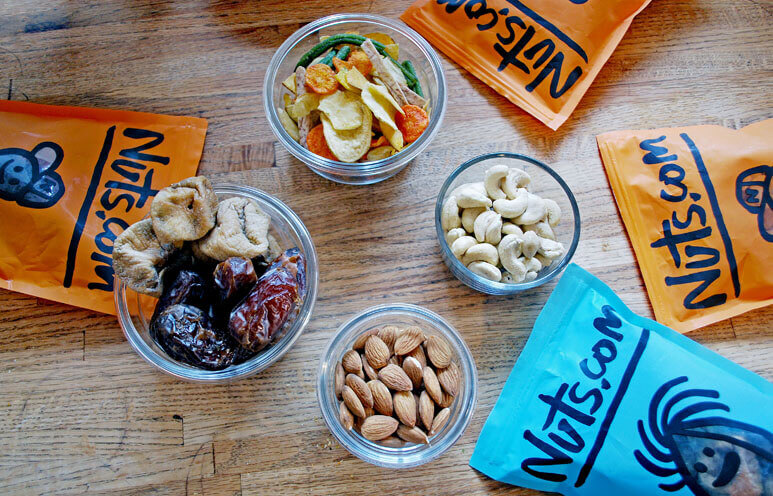
Depending on your workout, timing and consistency of your snack will differ immensely. For example, running in the morning will generally require a quick snack beforehand, since it is prefaced with a long period of fasting during the night. On the other hand, night runs after dinner will likely only warrant a restorative snack after the run— unless the run lasts for upwards of an hour, in which case a mid-run snack may be in order.
Take a quick look at our recommendations for different snacks to serve each of these scenarios below.
Pre-Run Snack
Running on an empty stomach may lead to premature fatigue and poor performance. While it’s important to know your body and experiment with works best for you, in general, runners benefit from eating a small meal before their workout (Bede, 2015). Ideally, runners should eat one or two hours before working out, incorporating complex carbohydrates into their meals. This might include whole wheat pasta, whole wheat bread, or starchy vegetables (Meyer, Boucherm & Leutholtz, n.d.).
Complex carbs will keep your body fueled for a long period of time, but if you’re short on time and have only 10 or 20 minutes before your run— opt for natural sources of simple carbohydrates. A piece of fresh fruit or a handful of dried fruit each makes a handy pre-run snack.
Also remember to eat some lean protein and healthy fat. This might look like a natural nut butter atop your fruit slices, or an egg white omelette cooked with olive oil or handful of nuts paired with your source of simple carbs (Bede, 2015).
Snack During Your Run
If you’re building up your endurance and running for less than 60 minutes, there is no reason to eat during your run. For longer runs, however, a snack becomes more important. Here, simple carbohydrates are your friends. Grab a banana, a handful of raisins, pretzels, or even baby food to fuel up mid-run. Keep in mind that the best food for runners is portable and lightweight (Bede, 2015).
Staying well hydrated during your run is just as important as maintaining a balanced diet. Drink small amounts of water frequently while you exercise. For longer runs, an electrolyte-rich sports beverage or energy gel is also a great way to refuel (Meyer, Boucherm & Leutholtz, n.d.).
Post-Run Recovery Snack
Once your run is complete and your breathing has slowed, your body is in recovery mode. This is the time to eat protein to facilitate the repair of your muscles. A snack that is roughly equal in the amount of protein and carbohydrates it contains is optimal for recovery (Bede, 2015).

Recommended Recipes for Runners
We’ve compiled some of our favorite recipes to provide healthy meals for before and after your runs. Each meal was formulated by our Health Nut and Registered Dietitian and selected to meet the nutritional needs of an enduring aerobic workout.
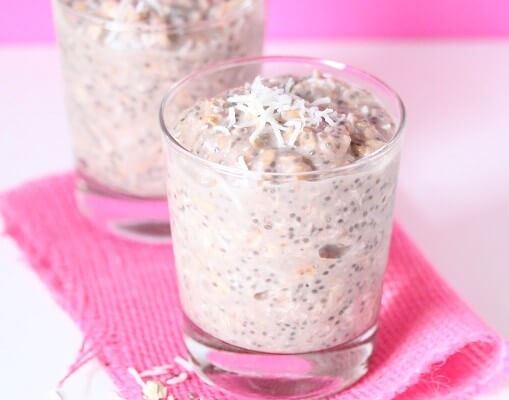
Strawberry and Banana Overnight Oats Recipe
The lifestyle of a runner requires proper preparation, and there is no better way to marry the demands of both a hectic lifestyle and a workout that requires complete nutrition than with this overnight recipe. Prepare this dish the night before a run for a fast and healthy breakfast to fuel your morning marathons.
Ingredients: Gluten-free rolled oats, chia seeds, walnuts, unsweetened shredded coconut, fresh or frozen strawberries, ripe bananas, agave or maple syrup, almond milk.
Total Time: 15 minutes
| Yield: 10 - 12 servings
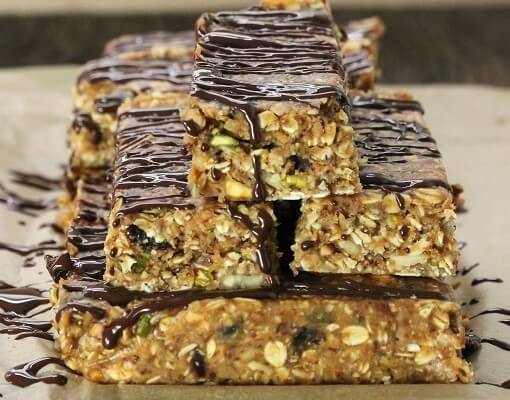
No-Bake Granola Bars Recipe {gluten-free, vegan}
Sometimes, we only have time for a quick bite before heading out on our oft-enduring escapades. Fuel your fun-run with a fast snack that’s full of healthy carbs. Each bar is ideal for preventing the perils of an empty stomach before a morning run!
Ingredients: Gluten-free rolled oats, peanut butter, dried tart cherries, pistachios, flaxseed meal, walnuts, pumpkin seeds, sunflower seeds, agave syrup. unsweetened applesauce, melted cacao nibs or dark chocolate.
Total Time: 15 minutes
| Yield: 8 - 10 servings
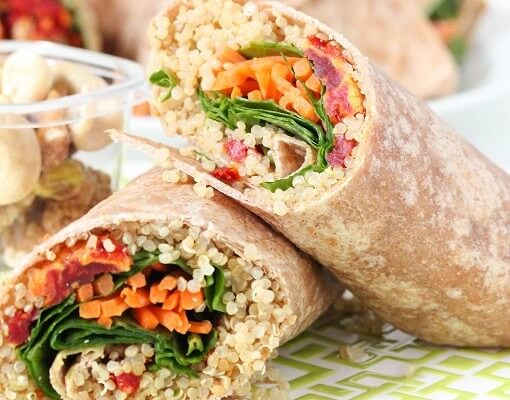
Quinoa Veggie Wrap Recipe {vegan}
For another quick and ready recipe that shakes things up from standard snacks, these delectable vegetable wraps include the potent protein and incredible carbs of quinoa to supply enduring energy throughout your run. The wrap also provides plenty of fiber to keep your digestive tract healthy.
Ingredients: Tortilla wraps, quinoa, hummus, fresh spinach, sun-tomatoes, shredded carrots.
Total Time: 30 minutes
| Yield: 4 wraps
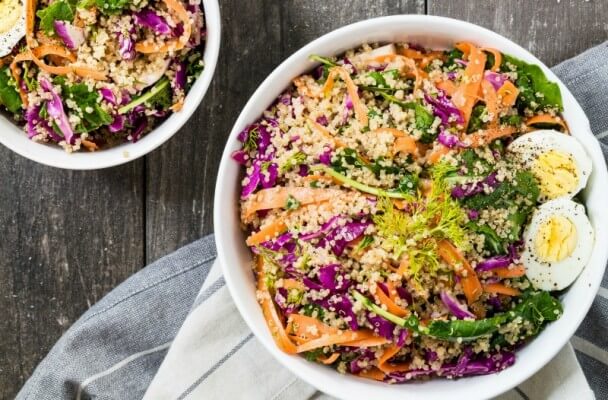
Kale Quinoa Salad Recipe
With a modest supply of fiber and a generous helping of healthy carbs, this salad serves everything you need to power through your workout in one scrumptious dish. Ideal for a quick, small meal before an evening run- this plate is sure to appease your appetite until after your workout.
Ingredients: Quinoa, fresh baby kale, purple cabbage, carrots, fresh dill, boiled eggs, rice wine, extra virgin olive oil, black pepper.
Total Time: 25 minutes
| Yield: 8 servings
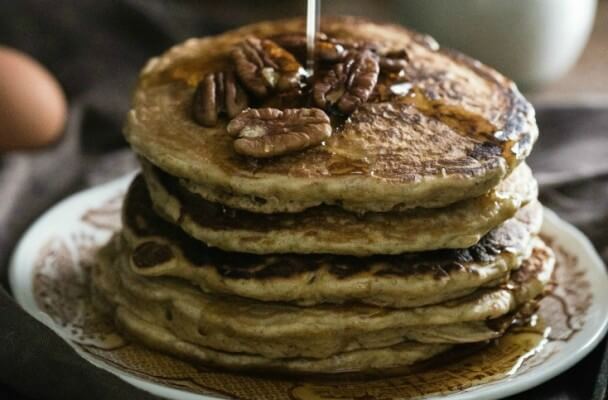
Quinoa Pancakes Recipe
If you run in the morning then a hearty second breakfast is a superb way to transition from workout to work day. The protein and carbs in these pancakes will replenish your reserves with a pleasant palate that is palpably more nutritious than your standard flapjacks.
Ingredients: Quinoa, whole wheat pastry flour (or brown rice flour for gluten-free cakes), eggs, milk, maple syrup or honey, raw pecans, baking powder, vanilla extract, salt.
Total Time: 15 minutes
| Yield: 7 pancakes
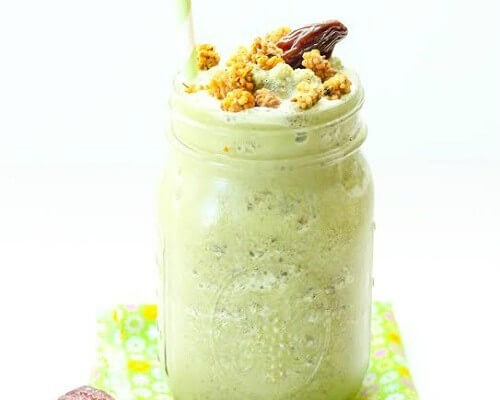
Matcha Green Tea Smoothie Recipe {gluten-free, vegan}
A light post-workout snack for those seeking to stay lithe and limber, this splendid blended beverage includes both rich sources of natural proteins to restore your muscles and a modest helping of simple sugars to provide energy for your recovery.
Ingredients: Almond milk, matcha green tea powder, hemp protein powder, almond flour, dried mulberries, pitted dates, flaxseed meal, ice cubes, stevia powder.
Total Time: 5 minutes
| Yield: 4 smoothies
Recommended Snacks for Runners
These snacks were selected to help runners meet their nutritional needs. Particularly, each treat was chosen for its supply of those nutrients emphasized above: protein, iron, carbohydrates, fiber, vitamin C, and vitamin E.
Healthy Eating
- Healthy Highlights
- 5 Uses for Cacao Powder
- 5 Ways to Eat Farro
- 6 Best Gluten-Free Foods
- Alcohol and the Body
- Almond Flour Recipes
- Anti-Aging Superfoods
- Beat the Afternoon Slump
- Benefits of a Plant-Based Diet
- Benefits of Baobab
- Benefits of Cashews
- Benefits of Coconut Oil for Hair
- Benefits of Coconuts
- Benefits of Dates
- Benefits of Fenugreek
- Benefits of Garcinia Cambogia
- Benefits of Goji Berries
- Benefits of Kale Chips
- Benefits of Monk Fruit Sweetener
- Benefits of Peanuts
- Benefits of Pecans
- Benefits of Pistachios
- Benefits of Pumpkin Seeds
- Benefits of Spelt Flour
- Benefits of Steel Cut Oats
- Benefits of Sunflower Seeds
- Benefits of Tiger Nuts
- Benefits of Turmeric
- Benefits of Walnuts
- Benefits of Wheatgrass
- Best Food Fads
- Cacao vs Cocoa
- Caffeine-Free Energy Foods
- Chocolate That's Good for You
- Diet vs. Exercise
- Fat Burning Foods
- Food Myths Debunked
- Foods for Bone Density
- Foods for Colon Health
- Foods for Healthy Hair
- Foods for Healthy Skin
- Foods to Help Sleep
- Foods to Reduce Stress
- Green Tea Benefits
- Healthy Baking Flours
- Heart Healthy Habits
- High Protein Health Risks
- How to Boost Your Metabolism
- How to Lose Weight While Aging
- How to Throw a Vegan BBQ
- Kaniwa vs Quinoa
- Little Health Foods
- Low-Carb: Fad or Friend?
- Making Healthier Desserts
- Mediterranean Diet Meal Plan
- Natural Beauty Products
- Nuts for Weight Loss
- Preparing Vegan Meals
- Preventing Muscle Degeneration
- Rare Superfoods
- Reduce Sugar Intake
- Save Time By Going Vegan
- Smarter Snack Swaps
- Smoothie Ingredients
- Soy Protein vs Whey Protein
- Starting a Plant-Based Diet
- Steel Cut vs Rolled Oats
- Sugar Substitutes
- Vegan Proteins
- Vegan Substitutions for Fall Recipes
- Why Go Vegan
- Healthy Meals
- Healthy Recipes
- Sports Nutrition
- Nutrition and Special Diets
- 21 Day Fix
- 5 Popular Diet Similarities
- Alkaline Diet
- Anti-Inflammatory Diet
- Calorie Counting
- Carb Cycling Diet
- Celiac Disease
- Cholesterol
- Clean Eating
- Crohn's Disease
- DASH Diet
- Detox Diet
- Diabetes
- Diabetes Diet
- Diet Pill Dangers
- Fat Burning Foods
- Gluten-free Diet
- Glycemic Index
- Heart Health
- High Blood Pressure Diet
- High Fiber Foods
- How to Eat Healthy
- How to Lower Blood Pressure
- Hypertension
- IBS Diet
- Ketogenic Diet
- Liquid Diet
- Low GI Foods
- Low-Carb Diet and Foods
- Low-Fat High-Carb Diet
- Mediterranean Diet
- Mediterranean Diet Foods
- Military Diet
- Nutrition Labels Explained
- Paleo Diet
- Raw Food Diet
- Superfoods
- Sustainable Weight Loss
- Thrive Diet
- Vegan Diet
- Vegetarian Diet
- Weight Loss Shakes
- Whole30
- Vitamins, Minerals & Nutrients

